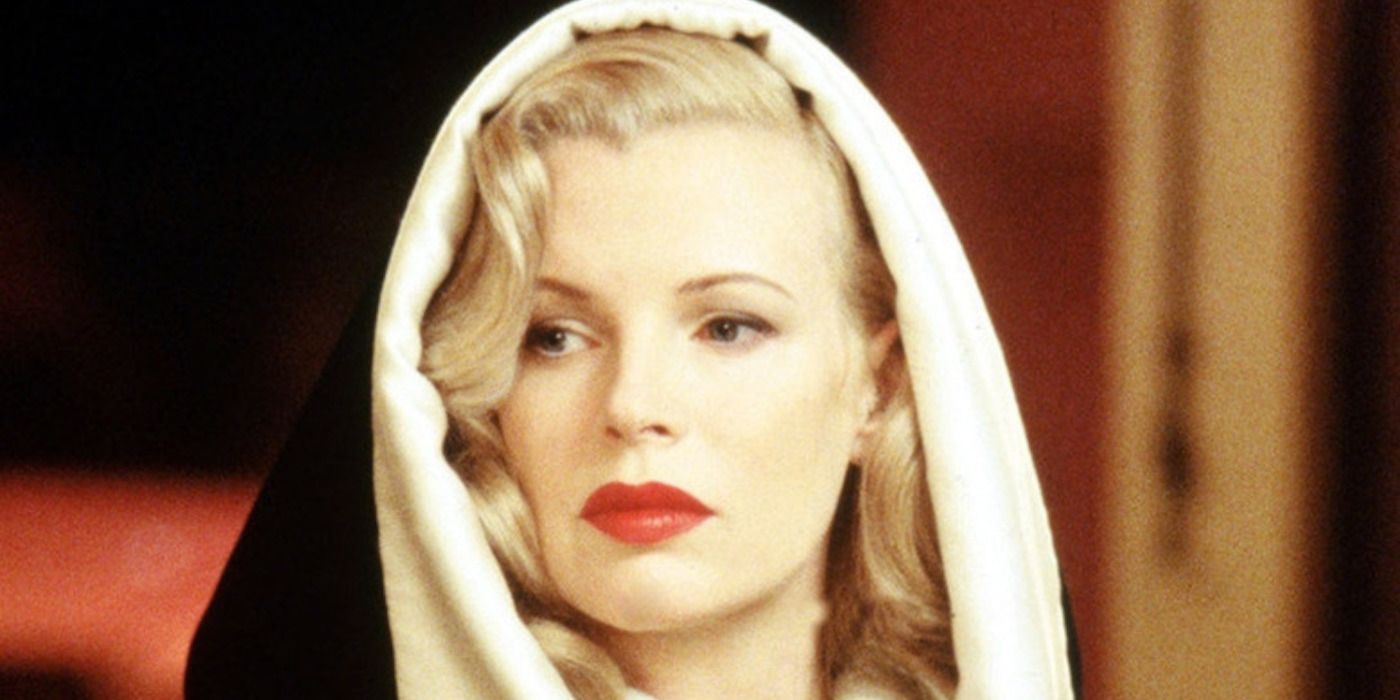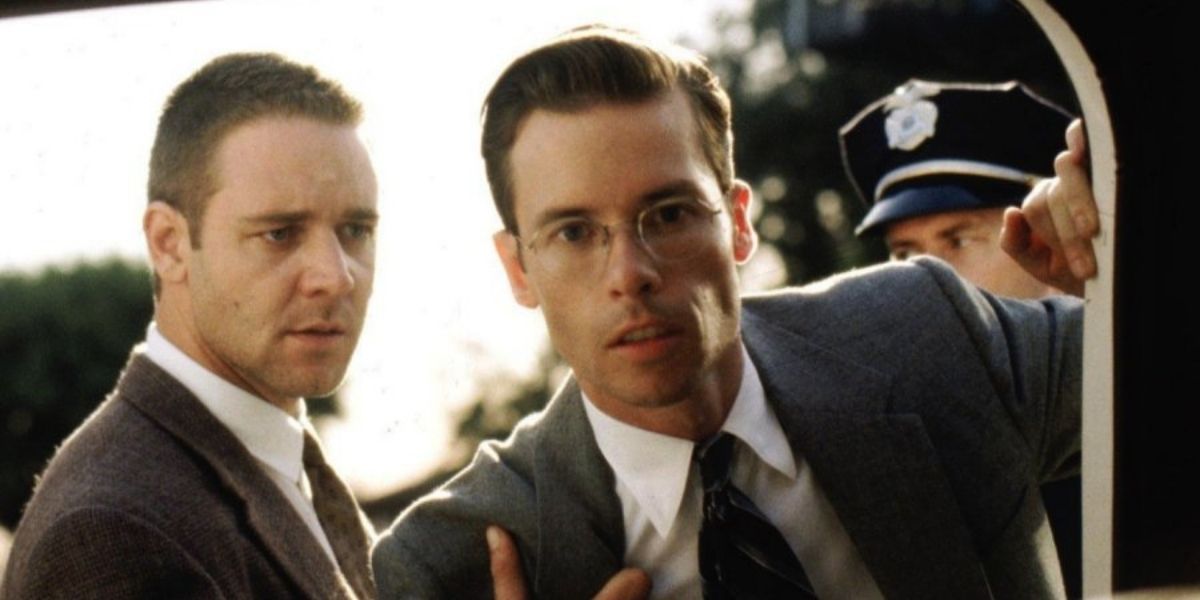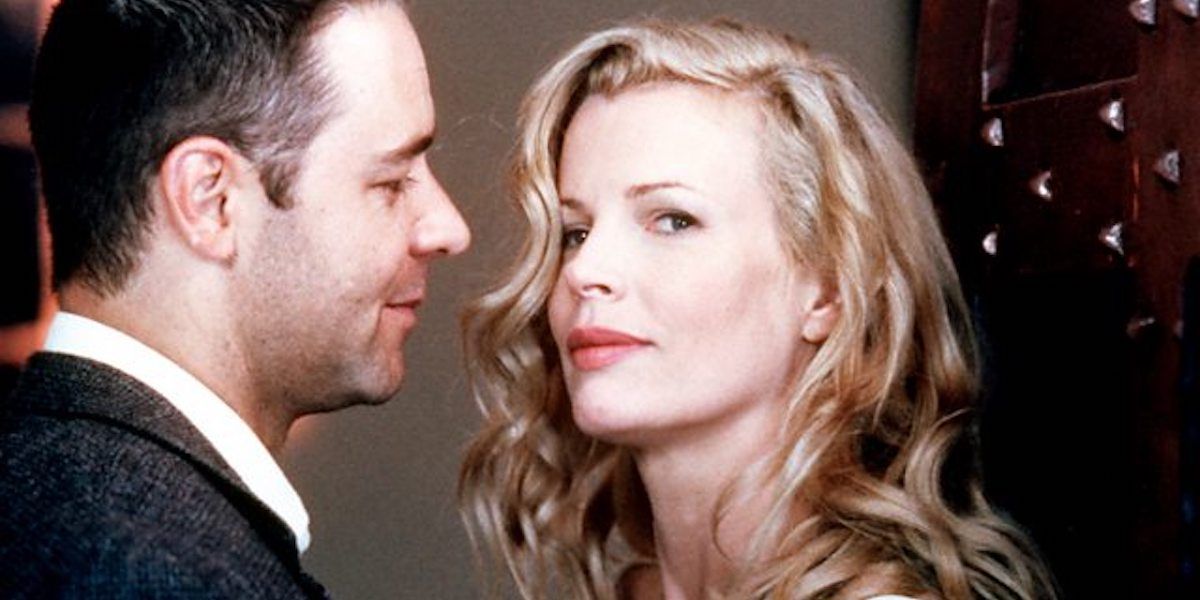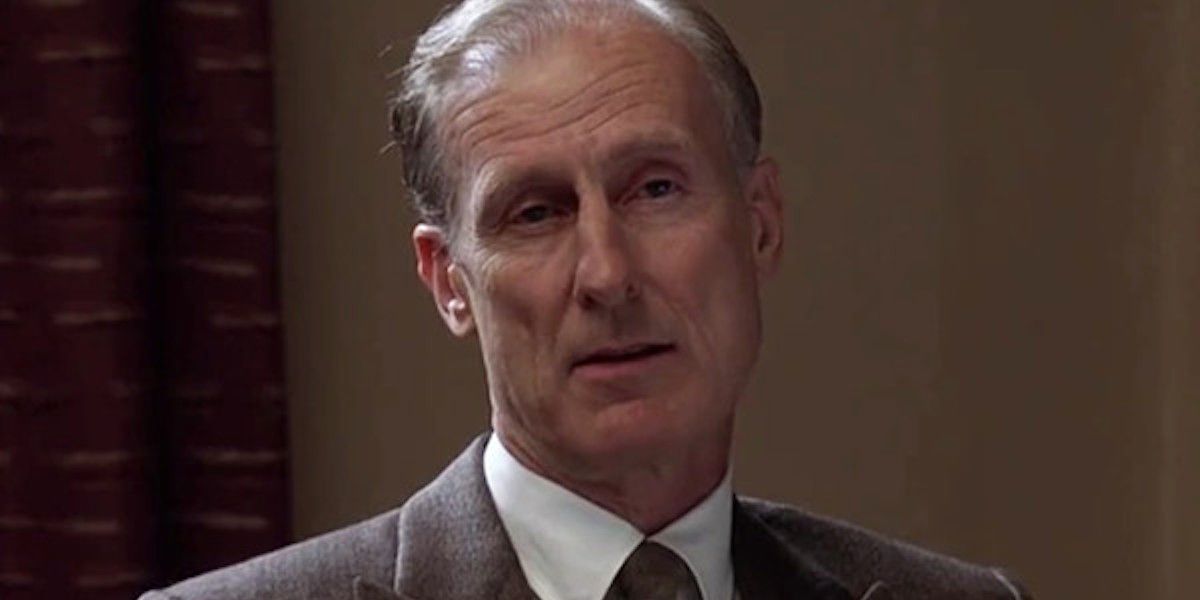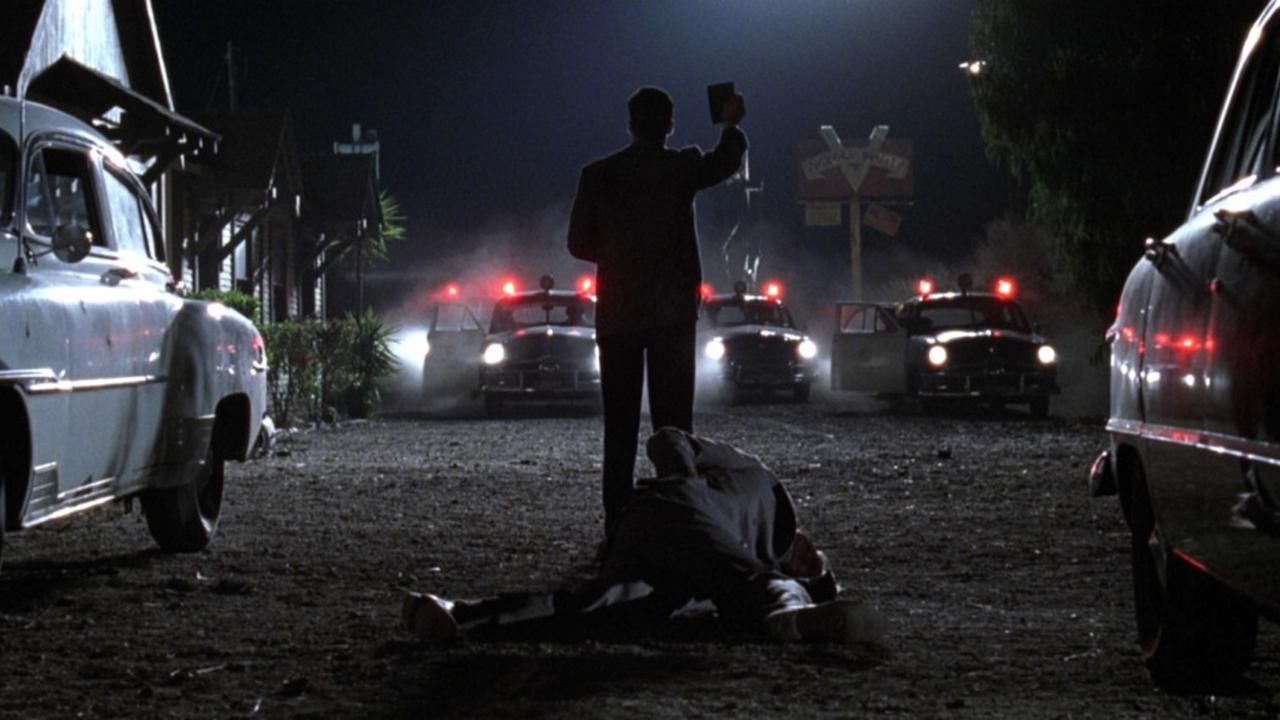Film noir enjoyed a revival in the ‘90s, with a wave of films that looked to the cinema and books of the '30s, ‘40s, and ‘50s for inspiration. These included period pieces such as the Coen Brothers’ Miller’s Crossing and modern takes like Basic Instinct, which gave classic noir settings and characters an explicit twist. 1997’s LA Confidential is arguably the most successful of them all. Both a commercial and critical hit, it’s true to its period setting and style, whilst feeling fresher than many of the noir exercises from the decade. This is largely due to the excellent source novel by James Ellroy, although LA Confidential is far from a faithful adaptation. Rather, it plays fast and loose with Ellroy’s novel to great effect, managing to distill its themes into one of the most enjoyable thrillers of the decade.
In LA Confidential, ambitious detective Ed Exley (Guy Pearce) earns the hatred of fellow cop Bud White (Russell Crowe) when he testifies against his corrupt partner, Dick Stensland (Graham Beckel). When Stensland is among several people killed at the Nite Owl diner, Exley and White clash over their individual investigations. Meanwhile, Sergeant Jack Vincennes (Kevin Spacey) has a side hustle busting Hollywood stars for scandal magazine publisher Sid Hudgens (Danny DeVito). However, he too becomes embroiled in the Nite Owl investigation and the three cops find themselves allied against corruption inside the Los Angeles Police Department.
LA Confidential's Convoluted Plot Has Nothing on Its Source Material
Part of James Ellroy's LA Quartet of crime novels, which included The Black Dahlia (made into a less successful film by Brian de Palma), the plot of the book is truly labyrinthine. For starters, there’s Exley’s father, very much alive in the novel and on the verge of building a Disneyesque theme park called Dream-a-Dreamland. Ellroy’s novels are a dense mix of politics, crime, and business (with a good measure of sex thrown in) and Exley’s family embodies all these things – a queasy mix of Disney and the Kennedys. In the movie, Preston Exley functions more with a Thomas Wayne-style absence, explaining his son’s drive for political gain (even when it makes him a pariah on the force).
Jack Vincennes’ story also gets curtailed in the film. In the book he’s a recovering alcoholic whose investigation of a pornography ring becomes obsessive when he’s sent to work for the Vice Squad. He works with Hudgens because of leverage against him and is known as “Trashcan” rather than “Hollywood” Jack, although he’s still obsessed with his gig as a technical adviser on a cop show. “Go get the facts, Jack, just the facts,” chides his commanding officer in the film, referencing Dragnet, the real show on which the fictional Badge of Honor is based. Ellroy’s books are a melting pot of influences, from true crime to tales of the entertainment industry, including the scurrilous scandal mags of the time. The film approximates this through an effective mix of period songs (notably “Ac-cent-tchu-ate the Positive” and “Wheel of Fortune” during two brilliant montages) and Weegee-style stills of crime scenes.
Bud White's Storyline Remains the Most Intact
Of the three leads, Bud White’s story remains most intact from the book, as does his complicated relationship with Lynn Bracken (Kim Basinger). White is driven to protect women through the demons of his own past, but he’s a typical Ellroy hero in being a violent and dangerous man himself. His relationship with Stensland, who we only know as irredeemably corrupt in the film, is more poignant in the book – as the older cop was a good mentor before he lost himself to alcohol abuse. While the film depicts White as a blunt instrument, on the page he’s more self-assured in his street smarts.
How LA Confidential Stays True to Ellroy's Vision
It’s easy to talk about “unfilmable” books in reference to historical sagas or psychological dramas, literature that is either too sweeping or too intimate to express in the span of a single movie. Characterising a crime novel as unfilmable seems counter-intuitive, given plotting and action of the genre that lends itself to cinema, but Ellroy’s work was a challenge. In adapting LA Confidential, director Curtis Hanson and co-writer Brian Helgeland made the sensible decision to cull the book’s branching plot lines. As well as the above-mentioned, elements that are greatly decreased or dropped altogether are Exley’s relationship with rape victim Inez Soto and White’s investigation of a string of sex worker killings. The film manages to stay true to Ellroy’s vision while maintaining a more straightforward storyline.
A key element in achieving this is the focus on Hollywood scandal magazine Hush Hush, which expresses Ellroy’s love of the language of the time through the character of Sid Hudgens. He’s the sometime narrator of the film, providing essential information about the power vacuum left by the arrest of gangster Mickey Cohen at the outset, but even his everyday speech is the tabloid lingo of the period. In Ellroy’s original, the action is punctuated by pastiche news stories and police reports that provide amazing depth to the author’s recreation of the period. The filmmakers maintain this through Hudgens’ insistent narration, full of “prime sinuendo,” about the famous figures that circle the main action.
One of the Film’s Biggest Liberties Is Also Its Best
“Rollo Tomassi,” the name Exley makes up for his father’s uncaught killer, becomes a key plot point – allowing Vincennes to point the finger at the movie’s big bad, Captain Dudley Smith (James Cromwell), at the moment of his own death. Vincennes is killed in an equally shocking way in the book, although it’s not at Smith’s hand – rather as the result of a random bullet during a raid. It’s a meaningless death that reflects the novel’s depiction of an amoral world. The film brings down Smith at the end (even if it means Exley having to shoot him in the back in a very unheroic moment of character development), although in the book he lives on.
The film version of LA Confidential is also successful because it pays loving homage to the films of the ‘40s and ‘50s that inspired it. Lyn Bracken is a ringer for Veronica Lake, star of the Raymond Chandler-penned The Blue Dahlia. However, her first meeting with Bud White best recalls the rapid-fire back and forth of Barbara Stanwyck and Fred MacMurray in the noir classic Double Indemnity. Subplots about dodgy land deals and the abuses of Hollywood, specifically Pierce Patchett’s (David Strathairn) collection of sex workers with surgically-altered faces – wannabe stars who have fallen foul of a predatory system – recall classic noir. Like Chinatown, with its corrupt water-rights plot, it’s about the nasty foundations of LA and, in the manner of Sunset Boulevard, it tears down the dream of Hollywood’s “golden era.”
Many ‘90s Retro-noir Films Are Exercises in Style Over Substance
Offerings such as Jack Nicholson’s Chinatown sequel, The Two Jakes, and Mulholland Falls seem to be mostly about dressing up in suits and fedoras. Along with incredible production design that perfectly recreates the early ‘50s, LA Confidential avoids the trap of meaningless reproduction by sticking with one of Ellroy’s most important themes in the novel. The film depicts institutional abuse and racism, with violence and corruption the norm among the cops. Exley is ostracized by his colleagues for not taking bribes and giving evidence in the conviction of officers who beat up Mexican suspects. He’s later complicit in manipulating three black kids towards a confession for the Nite Owl murders, as dozens of white, male cops form an audience ready for blood. Exley is only accepted by his peers after he kills all three suspects while they’re on the run. Ellroy’s book deeply explores a profession and a time that normalized abuse and turned people into abusers. At the end the film version, when the Police Chief announces a war on corruption and that “Los Angeles will finally have the police force it deserves,” the contemporary irony was only too clear to audiences given the LAPD scandals of the ‘90s.
This isn’t to say that LA Confidential doesn’t look antiquated in its own way by today’s standards. As a film concerning racism and misogyny, its main characters are three white males, with people of color and women only on the periphery – often playing stereotypes that are as dated as the period the film depicts. Nevertheless, LA Confidential is still a compelling thriller with a troubled conscience that sets it apart from its contemporaries.
The decision of the filmmakers to keep Ellroy’s bleakness rather than slavishly try to incorporate every plot was key to its success, as was the decision to cast relative unknowns at the time, such as Pearce and Crowe, in the leads. Basinger has her best role as Lynn Bracken, giving the sense that she has stepped out of a black and white movie – even if it is just a part she’s playing within the film. Ultimately, LA Confidential is more than just a noir pastiche or a literary adaptation. It’s a great thriller in its own right, rather timeless, and able to stand tall with classics by Howard Hawks and Billy Wilder. Of all the ‘90s noir films it’s the worthiest of a revisit. And for film fans who haven’t sampled the dark delights of James Ellroy’s early novels, it’s the perfect gateway drug.

